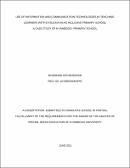| dc.contributor.author | Musimami, Idd Mubarak | |
| dc.date.accessioned | 2022-02-08T12:33:11Z | |
| dc.date.available | 2022-02-08T12:33:11Z | |
| dc.date.issued | 2021-06 | |
| dc.identifier.citation | Musimami, Idd Mubarak (2021) Use of information and communication technologies in teaching learners with dyslexia in an inclusive primary school: a case study of Kyambogo- primary School. | en_US |
| dc.identifier.uri | https://kyuspace.kyu.ac.ug/xmlui/handle/20.500.12504/425 | |
| dc.description | ix, 88 p. : ill. (some col.) ; | en_US |
| dc.description.abstract | The purpose of the study was to investigate the use of information and communication technologies in the teaching of learners with dyslexia in inclusive primary schools in Kampala Uganda. The objectives of the study were; to explore ICT tools used by teachers in the teaching of learners with dyslexia in Kyambogo Primary School, to examine the challenges faced by teachers in using ICT in teaching of learners with dyslexia in Kyambogo Primary School and to explore the experiences of children with dyslexia in using ICT in Kyambogo Primary School. A qualitative case study research design was used. The researcher interviewed six (6) participants in this qualitative study. These participants were involved because of the nature of the study on disability.
According to the study results, ICT was used to facilitate the reading, writing and illustration to children with dyslexia. The second objective of the study was about identifying the challenges faced by teachers in educating learners with dyslexia. From the study results, Teachers faced a number of challenges in teaching children with dyslexia ranging from lack of specialized training/ skills using ICT, financial constraints and inadequate ICT material. The objective here was to identify the Experiences of children with dyslexia in using ICT during learning. The results highly pointed out stigma and discrimination as one of the experiences that children with dyslexia face in utilizing ICT. This was in form of labeling, discrimination and isolation of these children. It is evident that children with dyslexia faced stigma and discrimination in form of labeling, discrimination and isolation of these children which makes their lives very hard.
The study recommends that the government should increase funding for ICT in primary schools to include the needs and the requirements of children with dyslexia to enable their learning. This can be in form of IPADS, laptops, smart phones and many more. There is also need for specialized rooms for children with dyslexia at Kyambogo Primary School and this calls for increased funding from government and its partners. On this same note, the government is called upon to provide ICT devices to both teachers and learners with disabilities in primary schools all over Uganda. | en_US |
| dc.language.iso | en | en_US |
| dc.publisher | Kyambogo University | en_US |
| dc.subject | Communication technologies | en_US |
| dc.subject | Teaching learners | en_US |
| dc.subject | Dyslexia | en_US |
| dc.subject | Primary schools | en_US |
| dc.title | Use of information and communication technologies in teaching learners with dyslexia in an inclusive primary school: a case study of Kyambogo- primary School | en_US |
| dc.type | Thesis | en_US |

